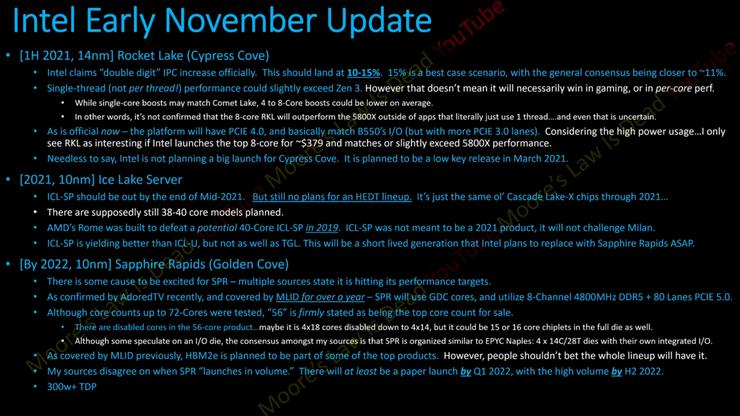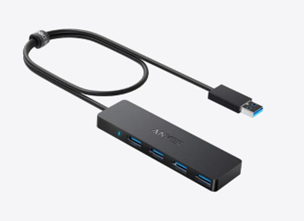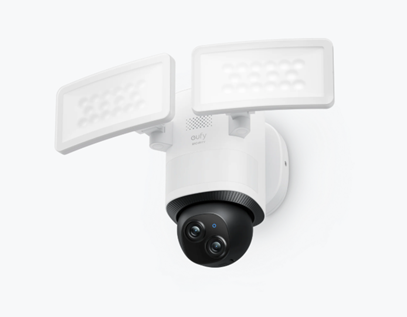New information regarding Intel's next-generation Desktop CPUs codenamed Alder Lake, Meteor Lake and Lunar Lake has been revealed by Moore's Law is Dead. MLID was the first to confirm the existence of the Cypress Cove architecture which is now been confirmed to power the Rocket Lake line of 11th Gen Desktop processors.
Intel Next-Gen Desktop CPU Rumors: Alder Lake With 10nm Golden Cove Cores & Core i9 CPUs Up To 8 Cores / 24 Threads, Meteor Lake With 7nm Redwood Cove Cores
The rumor states that Intel has at least three lineups planned for launch after 11th Gen Rocket Lake. These include the 12th Gen Alder Lake (confirmed by Intel), 13th Gen Meteor Lake and the 14th Gen Lunar Lake processors. It looks like Intel isn't thinking ahead of 'Lakes' at the moment which means that they will be following the codename hierarchy up till 2024. There's a lot to talk about so let's start with the Alder Lake family.
AMD Ryzen 7000 CPUs Might Have An Advantage Over Intel’s Raptor Lake DDR5 Memory Capabilities As 5200 Mbps ‘Native’ Speeds Listed For 13th Gen
Intel Next-Gen Desktop CPUs alleged details have been unveiled by Moore's Law is Dead!
Intel Alder Lake 10nm Desktop CPUs With Golden Cove Cores
The Intel Alder Lake family has officially been confirmed to be the 12th Generation Core family and will be launching in 2H of 2020 as revealed by Intel themselves. However, according to MLID, Alder Lake will be launching by 2022 which would indicate that the CPUs will miss their initial timeframe for launch.
Intel Alder Lake 12th Gen Desktop CPUs pictured. (Image Credits: Videocardz)The IPC estimates for the Alder Lake family are suggested to be 35-50% over Skylake (10th Gen CPU family) and 10-20% over Tiger Lake (Willow Cove Cores). The Alder Lake CPU will still be relying on a monolithic design and it is stated that we can expect clock speeds beyond what Tiger Lake CPU has to offer. So we are probably going to get around 5 GHz boost clocks but the higher clocks are only specific to the higher core count variants. The Alder Lake CPUs will also be outfitted with 32 Gen 12 Execution Units which equals 256 cores. The GPU could be a slightly optimized variant as revealed in recent Linux patches and would definitely feature improved performance over the existing Gen 12 based Xe GPUs.
As for SKUs, the lineup is expected to be configured with the following configurations:
Do note that the first two numbers are the standard core and thread count while the third number is the additional Gracemont cores which will be featured on the same die along with the big cores. According to the rumor, the top Core i9 or the entire 12th Gen lineup will include the Gracemont Atom cores as a part of the total thread count. Intel plans to advertise this as "Hybrid Threading Enabled" processors. We still have no information on how these threads would operate in real-workloads but only time will tell.

Intel adds Arc GPU, Rocky Linux, & multi-GPU functionality support to oneVPL 2022.1
Here's Everything We Know About The Next-Gen Alder Lake CPU Family
The Alder Lake CPUs are not only going to be the first desktop processor family to feature a 10nm process node but would also feature a new design methodology. From what we know so far, Intel plans to include a mix of CPU cores that are based on different IPs. The Alder Lake CPUs will come with standard high-performance 'Cove' cores and smaller yet efficient 'Atom' cores. This big.SMALL design methodology has been incorporated on smartphones for a while now but Alder Lake will be the first time we see it in action in the high-performance segment.
We don't have any specifics of which generation of 'Cove' or 'Atom' architecture Intel plans to utilize for its Alder Lake CPUs but their roadmap does point to Golden Cove and Gracemont architectures availability by 2021. It is possible that we would see these cores in actions first on the desktop CPU platform but would also be utilized in a Lakefield successor. You can learn more about the various Alder Lake SKU configurations here and here.
Following are some of the updates you should expect from Intel's 2021 architecture lineup:
Intel Golden Cove (Core) Architecture:
Intel Gracemont (Atom) Architecture:
In addition to the chips, the LGA 1700 platform is said to feature the latest and brand new I/O tech such as support for DDR5 memory, PCIe 5.0, and new Thunderbolt / WiFi capabilities. While the chip design methodology isn't anything new as we have seen several SOCs feature similar core hierarchy, it would definitely be interesting to see a similar outing on a high-performance desktop CPU lineup.
Intel Meteor Lake 7nm Desktop CPUs With Redwood Cove Cores
The Intel Meteor Lake lineup on the other hand is expected to be based on a new line of Cove core architecture. This is rumored to be known as the 'Redwood Cove' and will be based on a 7nm EUV process node. It is stated that the Redwood Cove is designed from the ground up to be an agnostic node which means that it can be fabricated at different fabs. There are references mentioned that point out to TSMC to be a backup or even a partial supplier for the Redwood Cove based chips.
The Meteor Lake CPUs may possibly be the first CPU generation from Intel to say farewell to the ring bus interconnect architecture. There are also rumors that Meteor Lake could be a fully 3D-Stacked design and could utilize an I/O die sourced from an external fab (TSMC sighted again).
As for what Intel's Meteor Lake family is going to offer, the family is expected to feature support on the LGA 1700 socket which is the same socket used by Alder Lake processors. We can expect DDR5 memory and PCIe Gen 5.0 support. But this is where the first contradiction comes as Alder Lake is suggested to feature support for both DDR4 and DDR5 memory. It is stated that some high-end designs based on the next-gen 600-series chipset will feature DDR5-only support while the more mainstream and budget options will come with DDR4 memory support.
The NVMe support is also expected to be limited to PCIe Gen 4 rather than PCIe Gen 5 which the platform will support. So at the end of the day, we might see the various chipsets and platforms being limited just to their own generation of processors they are introduced with. The launch is still a couple of years away so Intel partners will have ample time to sort out and work on future generation support.
Given that the LGA 1700 CPU socket is vastly different in design and size than existing LGA 1200 and LGA 115* sockets, cooler manufacturers will have to design new retention brackets around the socket to ensure proper compatibility of their existing coolers. Other than that, we can also expect Intel to feature brand new core technologies based on advanced (next-gen) process node for their Meteor Lake family.
Intel Lunar Lake Post-7nm? Desktop CPUs With Next-Gen Cores
Lastly, we have the Intel Lunar Lake family which is expected to launch around 2023-2024 and was just recently spotted in graphics drivers. The Lunar Lake CPUs will most likely replace the Meteor Lake lineup and hence fall in Intel's 14th Gen branding unless Intel decides to change that by then since we are talking at least two or three years from now (2022-2023).
What's interesting is that Lunar Lake is listed with Gen 12.9 graphics. This suggests that we are looking at a refined variant of the Gen 12 architecture rather than Gen 13 since that starts with other two products that we will talk about here. Alder Lake Desktop CPUs are listed with 12.2 & Meteor Lake are latest with 12.722 Generation codenames.
There's no telling if Intel will still be supporting its LGA 1700 platform by the time Lunar Lake is launched. Currently, Intel has kept socket and platform compatibility alive for at least two CPU generations but that might change in the future due to increased competition from AMD and its Ryzen (AM5) platform.
You can watch the full video where MLID discusses the Intel next-gen desktop CPU rumors below:
Intel Mainstream Desktop CPU Generations Comparison:
| Intel CPU Family | Processor Process | Processors Cores/Threads (Max) | TDPs | Platform Chipset | Platform | Memory Support | PCIe Support | Launch |
|---|---|---|---|---|---|---|---|---|
| Sandy Bridge (2nd Gen) | 32nm | 4/8 | 35-95W | 6-Series | LGA 1155 | DDR3 | PCIe Gen 2.0 | 2011 |
| Ivy Bridge (3rd Gen) | 22nm | 4/8 | 35-77W | 7-Series | LGA 1155 | DDR3 | PCIe Gen 3.0 | 2012 |
| Haswell (4th Gen) | 22nm | 4/8 | 35-84W | 8-Series | LGA 1150 | DDR3 | PCIe Gen 3.0 | 2013-2014 |
| Broadwell (5th Gen) | 14nm | 4/8 | 65-65W | 9-Series | LGA 1150 | DDR3 | PCIe Gen 3.0 | 2015 |
| Skylake (6th Gen) | 14nm | 4/8 | 35-91W | 100-Series | LGA 1151 | DDR4 | PCIe Gen 3.0 | 2015 |
| Kaby Lake (7th Gen) | 14nm | 4/8 | 35-91W | 200-Series | LGA 1151 | DDR4 | PCIe Gen 3.0 | 2017 |
| Coffee Lake (8th Gen) | 14nm | 6/12 | 35-95W | 300-Series | LGA 1151 | DDR4 | PCIe Gen 3.0 | 2017 |
| Coffee Lake (9th Gen) | 14nm | 8/16 | 35-95W | 300-Series | LGA 1151 | DDR4 | PCIe Gen 3.0 | 2018 |
| Comet Lake (10th Gen) | 14nm | 10/20 | 35-125W | 400-Series | LGA 1200 | DDR4 | PCIe Gen 3.0 | 2020 |
| Rocket Lake (11th Gen) | 14nm | 8/16 | 35-125W | 500-Series | LGA 1200 | DDR4 | PCIe Gen 4.0 | 2021 |
| Alder Lake (12th Gen) | Intel 7 | 16/24 | 35-125W | 600 Series | LGA 1700 | DDR5 / DDR4 | PCIe Gen 5.0 | 2021 |
| Raptor Lake (13th Gen) | Intel 7 | 24/32 | 35-125W | 700-Series | LGA 1700 | DDR5 / DDR4 | PCIe Gen 5.0 | 2022 |
| Meteor Lake (14th Gen) | Intel 4 | TBA | 35-125W | 800 Series? | TBA | DDR5 | PCIe Gen 5.0? | 2023 |
| Arrow Lake (15th Gen) | Intel 20A | 40/48 | TBA | 900-Series? | TBA | DDR5 | PCIe Gen 5.0? | 2024 |
| Lunar Lake (16th Gen) | Intel 18A | TBA | TBA | 1000-Series? | TBA | DDR5 | PCIe Gen 5.0? | 2025 |
| Nova Lake (17th Gen) | Intel 18A | TBA | TBA | 2000-Series? | TBA | DDR5? | PCIe Gen 6.0? | 2026 |




